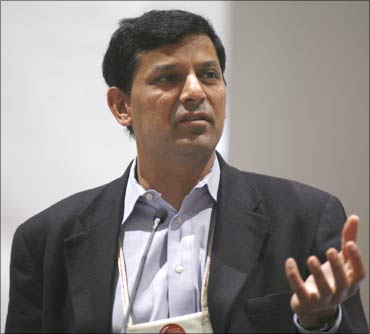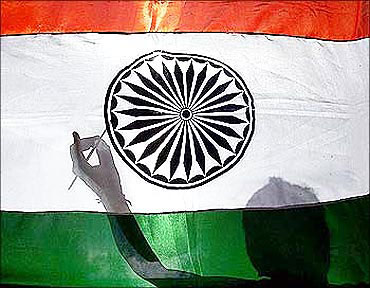
Five years ago, Raghuram G Rajan, Eric J Gleacher Distinguished Service Professor of Finance at the University of Chicago's Booth School of Business and then chief economist of the International Monetary Fund, presented a paper at the Jackson Hole Conference -- an annual gathering of bankers, economists and private-sector players -- called, 'Has Financial Development Made the World Riskier?'
It warned that recent developments in the financial sector 'create a greater probability of a catastrophic meltdown'.
In his new book, Fault Lines, Rajan says his views were not well received. Fault Lines now has bagged the coveted 2010 Financial Times and Goldman Sachs Business Book of the Year Award. The award is given to books 'that investigate and explain the financial crisis'.
The other finalists were: The Art of Choosing by Sheena Iyengar, The Facebook Effect by David Kirkpatrick, The Big Short by Michael Lewis, More Money than God by Sebastian Mallaby, and Too Big to Fail by Andrew Ross Sorkin.
Rediff.com spoke to Raghuram Rajan about his book, what enthuses him about the Indian economy, and what are the concerns he has with India's chaotic progress . . .
. . .

Stories on your book refer to the speech you made in 2005 warning of a worldwide credit crisis . . .
I did not write the book to discuss the speech. I refer to it in the beginning of the book, but this book was written to explain what we need to do to avoid another economic meltdown.
You have said in the book that your children gave you the reason to try to make the world better. Since you have made America your home for over two decades, let us discuss how America can be made a better place. . .
I worry that America, which used to be a land of opportunity, is losing that edge. So many Americans today do not have the education and training to compete in the global marketplace.
The New York Times had an article recently that said thousands of jobs in America are going unfilled because there are not enough qualified workers, at a time when the overall unemployment rate is 10 per cent.
In certain segments of American society more people are going to jail than college. This cannot be good.
Several decades ago Americans were better equipped to deal with technological changes. They were willing to uproot themselves and travel across the country to take up a new job.
. . .

But the demands on Americans today are much greater than before and what makes the situation worse for them is the poor quality of education. Many have to return to school to correct a deficient high school education, before they can get a university education.
Of course, when the average Americans lose their sense of optimism, they can hold their open economy and open migration policies responsible.
When people find reasons to be optimistic, they welcome diversity. In the absence of the ability to compete, people become like the proverbial crabs in a bucket, ready to pull each other down.
Not only does fear of immigration rise, civic discourse also suffers. In the Congress, Democrats and Republicans seldom co-operate any more.
As I argue in the book, the enormous amount of government money flowing into housing before the crisis was partly because politicians were trying to use housing credit as a way of making ordinary Americans forget about their stagnant incomes.
After all, if your house price was growing, and you could take out home equity loans, you not only felt wealthier, but could consume more.
The worry is that now that the housing markets are bust, politicians will have to find some other way to push consumption, which will impair the long-term health of the economy.
. . .

Another source of anxiety is the weak safety net. Though workers from across the world want to come here, they do not know how weak a safety net America has for workers who lose their jobs.
Even the basic jobless benefits in America last for six months while in France it lasts for three years, and 18 months in Germany.
Moreover, until the new healthcare bill kicks in, if you lose your job, you lose health insurance.
What this means is that the level of anxiety and the pressure on politicians, again mounts if many people lose jobs. And if the recovery proves slow in creating jobs, as the last two (in 1991 and 2001) and this one are proving to be, anxiety increases even further.
The pressure on the Fed to maintain low rates for an indefinite period increases, which has the effect of precipitating risk taking and asset price booms in financial markets.
In the long run, these prove unsustainable and lead to financial crises.
. . .

You sound more optimistic about India. . .
I have many serious concerns about India, but on the whole India is in many ways in a sweet spot.
India has done very well, whether in handling the impact of the financial crisis or in progressively liberalising the economy.
People talk about India's chaotic democracy, but a lot of progress has to do with coalition governments at the center and in the states. Coalition or regional party-led governments meant certain amount of independence from dogmatic policies.
And at the state level, be it in Tamil Nadu, Maharashtra or Gujarat, the state governments took initiative in liberalising their economies and ran with it. They did not wait for the Centre.
. . .

The breakdown in the Congress party acted as a catalyst in liberalisation. And the good thing about India is that despite the criticism of a free enterprise economy, no party wants to go back to the 1960s and 1970s of state-controlled economy.
A few years ago, Lee Kuan Yew, Singapore's great leader, said India cannot grow fast because it is a democracy.
India has shown that you don't have to sacrifice democracy to have economic growth. And I believe India's progress is not over.
One of the key reasons why India and China are succeeding so spectacularly is because the economic reforms in those countries have unleashed the creative energies of millions; in fact, more than a third of the world population.
While companies in China have become leaders in developing electric car batteries, Indian companies are producing affordable electric cars.
The same private companies in India that had languished under government control for over four decades are emerging as innovative leaders in Asia.
I write in my book that if China and India can reverse centuries of decline in the space of two decades, perhaps even Haiti may be able to use the ferment created by its recent tragedy to overcome the greater tragedy of its history.
. . .

Isn't the rise of the Naxalites a serious concern to India?
It is! Prime Minister Manmohan Singh has said it is the greatest threat to India. I believe the rise of Naxalites in some regions in India reflects the weakness of government at the local level.
In many villages, the schools are not functional; teachers don't come to classes. The police don't register cases if the victims are not well connected.
Big industrialists get mineral rights, dispossessing tribals. All this creates a lot of scope for militancy to flourish. I believe if the governance is improved across the board swiftly, the chances of Naxalites rising elsewhere will be minimised.
In Bihar, Nitish Kumar (the chief minister) has made an enormous difference. He has put many criminals in prisons, which is not a small achievement. Good local governance is critical to India. You cannot really fight militants by military means. Military actions create a more dramatic problem.
If land transactions in India are done with transparency, unrest in rural and tribal areas can be reduced. But powerful interests who benefit from the murkiness of land rights oppose land reforms.
The License Permit Raj we saw for over three decades has given way to the Raj of the land mafia. Well-connected industrialists, developers, politicians and the home-grown mafia have the means of enforcing their property rights, even when they are murky.
. . .

These groups can buy property cheaply because other competing buyers are far less confident of their rights over the property on sale. Having bought the property, the group has the means of having its rights enforced and even enhanced by altering the zoning restrictions on the land.
It can also extinguish others' rights and sell the developed property at far higher prices. These land entrepreneurs enjoy enormous incomes from these intermediation services, which give them strong incentives to oppose reforms.
The situation may be even worse. Those who fight on behalf of the poor and powerless want to keep things the way they are because it gives them more power over the poor.
The Naxalites, as well as politicians of every hue, fill the vacuum created by the government's unwillingness to clarify and enforce property rights. The government gives them a ready-made cause -- everywhere land has to be acquired on a large scale, it creates the opportunity for such groups to organise an opposition and gain political support.
Good local governance should include enforcing land laws and stopping the illegal land grabs and similar actions.
If individuals and communities could deal securely and in full transparency with land acquirers, without fear of being cheated, the political wind would be taken out of the sails of the vested interests.
. . .

What else worries you about the Indian system?
I have written how the proximity to the government is an enormous source of profitability in India, and is reflected in the huge disparities of wealth.
Jayant Sinha of the Omidyar Foundation pointed out, before the recent crisis, that India was the country with the second largest number of billionaires per trillion dollars of GDP (gross domestic product), second only to Russia.
Given that Russia has fared somewhat worse during this crisis, I would not be surprised if India has already overtaken Russia in this dubious distinction. I say dubious not because I am against wealth, but because land, natural resources and government contracts or licenses are the predominant sources of the wealth.
And all of these factors come from the government. It would augur better for India if more of its billionaires came from competitive sectors with free entry like software.
. . .

Do you think India can overcome these challenges?
India's economy has a number of factors going for it. It is more balanced than other fast-growing Asian economies. Partly as a result of democratic pressures, it has not been as biased towards producers or exporters, and, therefore, does not require a major change in strategic direction.
However, there are a number of areas where it needs to act far more decisively and rapidly than it is doing.
Whether it does so will determine whether its 1.2 billion people play the role on the global stage that their numbers entitle them to, or whether the excitement over India's recent performance peters out. Growth, as many a country's experience has shown, cannot be taken for granted.
There is, however, a reason why India's story, if it is successful, will be an inspiration to poor countries. Few countries have grown rapidly from abject poverty even while their people have enjoyed full democratic freedoms.
. . .

If messy, chaotic India -- with its many communities, languages, religions, and castes -- can pull it off, it can undercut the legitimacy of authoritarian regimes in much richer countries who insist that the loss of political freedoms is the price their citizens have to pay for economic growth.
The world has much to gain from a successful India.
Finally, India's ability to generate growth is so much easier because its starting point is so much further behind; there are lots of low-hanging fruit.
But India's relative poverty suggests that it has not been able to pick these fruit in the past. Many Indians are justifiably proud of what they have achieved in the last few decades, but India has a long way to go before it becomes a middle-income country.
We must not let the justifiable pride in what we have achieved go to our heads. There is so much more of a road to travel.
. . .

What message do you have for the Indian youth?
The roots of change lie in the hands of the youth. I have met many fine, upstanding, committed individuals in India, from those running NGOs (non-governmental organizations). . . striving for change at the bottom, to those in the political establishment, striving for change at the top.
And we have a strong tradition of democracy, with hundreds of millions of first-time voters who are eager for change and not constrained by the past.
Their energy has to be channeled to combat the very real dangers that face our country. The battle lines are laid out. The choice between self-interest and public interest is clear.
And if all of us join the battle, I have no doubt who will succeed.